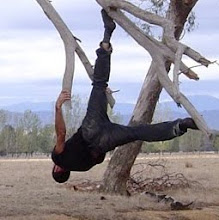I was reading Holmgren's 'Permaculture: Principles and Pathways Beyond Sustainability' last night and read a couple of passages which took me back to our brief exchange about the word permaplay, permaculture etc., and in particular to my mild general objection to the word 'permanent'. So I noted these passages when I read them: xxx "Even the idea of permanence at the heart of permaculture is problematic to say the least." And, xxvii 'The limitation of this concept of sustainable culture is that it suggests some stable state that we might arrive at sometime soon (by applying permaculture principles)".
It goes without saying that individual life is temporary. Cultures, however, are more ongoing. They are mutable and transforming, but ongoing. Some last longer than others, but of course no culture is totally permanent in a literal sense. The ones that last longer directly participate in, or mimic closely, natural systems. We can say these cultures are more permanent than others. The ones that die out more quickly have generally adopted linear, anti-ecological philosophies and economics based upon social divisiveness and relations of avoidance. As I've often quoted, the Dja Dja Wurrung lived in these parts for 40,000 years and aboriginal culture continues to survive in areas of Australia where their genocide was less fierce. Aboriginal culture is based on relations of common substance, they see themselves as contiguous with the world. If you compare continuous Aboriginal culture to our own, you can say it is permanent and ours is not, despite the fact that we have done everything in our power to make their culture impermanent like ours. We see ourselves as exclusive and separated, the corollaries of which (dioxins, warheads, plutonium, DDT) brand our culture abstract, fantastical and impermanent.
If you interpret the word 'permanent' in the above three portmanteaus as meaning 'static' or 'fixed' you've missed the point. Permanent here implies mutability. Nothing exists for very long in a rigid state. The most controlling regimes are generally the most vulnerable to collapse. Immutability equates to impermanency. The steady-state of a forest implies a forest in active, cyclical momentum, where everything is taken up by chewers, borers or suckers, used for life, excreted, only to be taken up and used again in a never ending cycle. The steady-state of a forest can only be mutable. Its health relies on constant change, active reciprocity and chance encounters. A natural ecology, operating within a non-hierarchical, closed-cycle where every organism is a participant, is what a modern permaculture mimics at a systems level.
Our culture is currently predominated by post-structuralist philosophy: post-modernism. "Keep moving, even in place keep moving." (Gilles Deleuze). Post-moderns brought us some better thinking about race and gender and sexuality, and brilliantly critiqued the modernist male bully, but all this has done little to mitigate our abusive impermaculture. In fact our culture's aggression has only intensified over the past 30 years. Post-modernism coincided with psychopathic Neo-liberalism, as if they begat each other through oppositional warring. But by linear progression – pre-modernism, modernism, post-modernism – Po-mo is yet another urban-centric, ecologically disembodied school of philosophy that "rages against permanency." (Hamish Morgan).
The sign below is representative of our culture. The three types of organisms found on Earth all coerced into being us, shooting off on their own singular path, everything operating autonomously, everything monological and separating out, everything getting closer to the end of their individual paths. Impermanence. Linear death. Chk chk boom.










2 comments:
Permanent. Aboriginal culture was only permanent because it moved. The community survived, in a sense, by staying apart.So its like permanent flux, 'rolling with the country', that enabled Aboriginal cultural continuity. Which is what you are saying: that permanence doesn't mean fixity but constant adaption and flux (relative to natural cycles and processes) *(which, to come to the defense of post-structuralists, is what they were on about, endless creation). I like this thinking on permanancy, its cool, and kind of paradoxical, it makes me quizzical, there is a tension which is enticing. I looked it up on the OED and permanent is from the French word 'permanere' which means 'remain to the end'. Hey, there is another tension. It is like permanancy is about outlasting others! Is it almost a term of the past, rather than the future? Hamish.
hi hamish, great to hear from you.
interesting etymology re permanere, and by extension, 'humanure' - the remains from our rear end useful for growing food (also known as night soil).
yes, in these parts too aborigines moved frequently within tribal territories. But they weren't only hunter/gatherer. The local mob strategically farmed yams (same nutritional value as potatoes), by encouraging the conditions for greater propagation of them. yam ovens, or myrniongs are still found here and nearby fields of yam daisies proliferate.
containment is a big problem in industrial societies. hyper-stimulant foods (drugs) mixed with physical containment is a recipe for social and ecological malfunction. even when we travel we are contained - deep vein thrombosis, fear of the exotic, etc
free-ranging! it's for everyone (not just your beloved chooks).
Post a Comment